Austrian Red Cross together with its partners embarked on a 5-years (2019-2023) regional WASH (Water, Sanitation and Hygiene) capacity strengthening programme in East Africa. Within WASH, it covers a wide range of thematic fields that include gender, diversity and inclusion; food security, nutrition and livelihoods; community engagement and accountability and others.
Ethiopian Red cross association Sidama regional office is one of the Skybird micro project implementer entitled” Economic Empowerment of Women with Skills around WASH Facilities, food security and Manufacturing (EEWSWFM), in Yirba 01 Kebele, Boricha district, Sidama regional state of Ethiopia”.
Boricha district is one of the 36 districts of Sidama regional state of Ethiopia. There are 14 kebeles in Boricha district, one of which is Yirba 01, the administrative capital of the district. The project is implemented in Yirba 01 kebele. There are 967 households with a population of 4737 people (2347 male and 2390 female) in Yirba 01. The town is faced with severe water scarcity with a 300 m3 reservoir which is recharged once a week as the only available source for water. With regards to sanitation, only around 15 % of the population have access to improved latrines and the lack of access to sanitation products only exacerbates the situation. The population also faces a threat from food security due to water scarcity in the area.
INTERVENTION
The Skybird micro project in Yirba 01 kebele involved construction of public toilet and shower facilities at the town bus station with an adjacent one stop shop for sanitation marketing activities to sell sanitation & other WASH products partly produced at the site and a vertical farming model to promote this farming technique to the community. Two water storage of 3000lt each are installed to supply water to the toilet and shower. The district government office provided 120 m2 land for the construction of the facility.
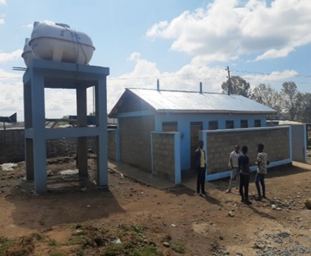
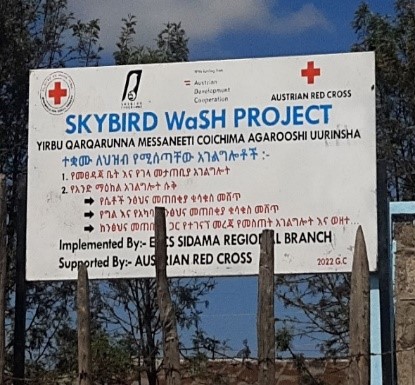
The micro project was implemented from November 1st 2021 till October 31st 2022. The project launching workshop was held in February 2022, construction of the facilities began in May 2022 and the facilities were inaugurated in September 2022. 20 (15 women and 5 men) beneficiaries from the community were organized as an SME in April 2022 to manage the facility. ERCS handed over the management of the facility to the SME in March 2023 after providing trainings that include public toilet and shower management, sanitation marketing, entrepreneurship and financial management.

The public toilet block has two sections – one for men and one for women, each consisting of three-cubicle lined pit latrines with sit-down toilets, one accessible toilet to accommodate people with physical disabilities and two shower cubicles. The men toilet in addition features urinal.
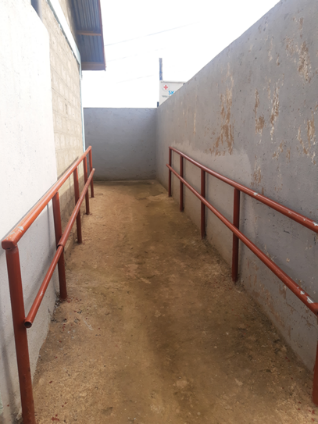
The SME members are now managing the facility and providing the service to the community. They have selected three core members: Chairperson, Secretary and Cashier (Treasurer). They meet every two weeks for updates on the overall activity as well as to assign toilet, shower and one stop shop attendant in a weekly rota.
They are using a pay-per-use system aiming to cover operating costs (wage of attendant, water bill, consumables such as soap and cleaning materials etc. ) and maintenance costs (desludging and other facility maintenances – plumbing repairs, painting etc. ) of the facility and generate a profit.
They are charging 25-birr fee (approximately 0.45 US$) for use of shower and 5-birr (approximately 0.1 US$) service fee for use of toilets. Shower users are provided with soap.
The public toilet serves people working at the bus station, users who are in transit or residents who are away from home by-passing the bus station and need access to toilet. Such public toilet facilities also come in handy for residents who have poor or no toilet facilities. Currently the toilet & shower block is currently receiving 10 to 15 users each per day, with gross income of up to 2000 birr a week.
The micro project has integrated a one stop shop selling sato pans, menstrual pads, detergents and other WASH products. The SME members also offer coffee/tea as a means of additional income generation, also help to draw more customers to the public sanitation facilities thus making them more financially viable.
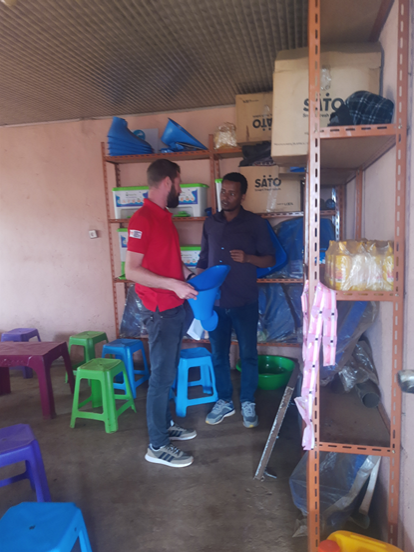
The SME members are growing vegetables on a vertical farming for own consumption at the same time promoting the farming technique to the community. They also have plans to add additional business opportunities such as adding food vendor services and to have a water kiosk integrated into the facility.

OUTCOMES
A team from Austrian Red Cross Association (AutRC) and Ethiopian Red Cross Association (ERCS) conducted interviews with some of the SME members and the public toilet & shower users on June 12, 2023.
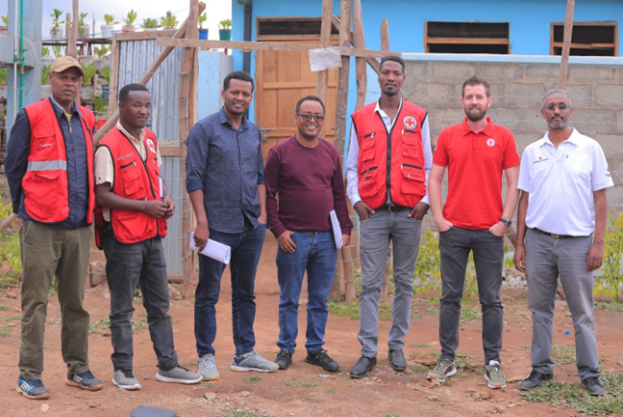
Fatune Gota who is chairwoman of the SME said “People passing by the area used to urinate and through garbage. It was difficult for the bus station users to stay in the area to wait for buses due to the bad smell. It is a miracle to see people are spending their day here. The community gained dignity of using proper toilet and shower.”
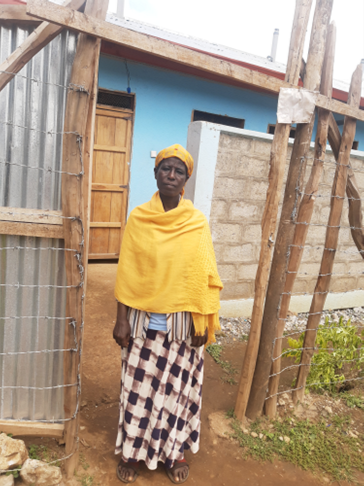
Temesgen Hadesu, one of the SME members, described the situation of the town’s bus station saying “Surrounding of the bus station was unhygienic before the public toilet is constructed. People use the night to defecate in the area. Urinating during the day time was common. The odor was unbearable. Residents and business owners operating surrounding the bus station used to complain to local government offices. Passengers and traders had no facility at the bus station to relieve themselves when nature calls.”
Comparing the situation, he said “This is the first public toilet and shower facility for the town. Now there is no smell, open defecation on the area is eliminated completely. Sometimes people need urgently to use the toilet and may not have money to pay. We let them use for free as the other option, when they cannot hold the call of nature any longer, is to do it in the open area. We don’t want that to happen.”
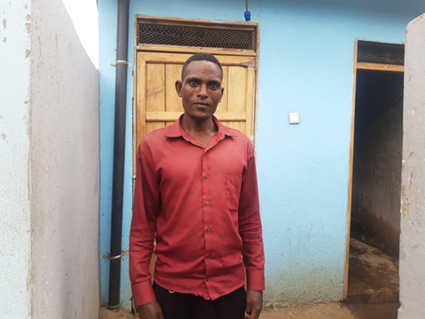
Adagnu Ashebir, who works at the bus station and uses the toilet and shower facilities, said “I do morning exercise with my friends three times a week and we all come here to take shower after that. We never had that option before.”.
Tarekegn Tadele, the Skybird project coordinator at ERCS Sidama branch, said “The intervention addressed many positive changes including access to WASH, income generation, disease prevention, women empowerment and reduced government load. The joy the project brought to the community is huge. The community have accepted it from the start. People were coming and visiting the construction progress on their own initiative.”

He also pointed out the key elements of the intervention that led to the success of the project were the strong need assessment that was conducted before going to implementation, the local government support especially during the area selection in issuing land at the bus station of the town, the strong follow up made by the branch, quality of the construction and the intervention being able to generate income.
He described the limitations of the intervention saying “septic tank would have served better compared to pit latrine to achieve longer desludging time. The other limitation is four shower rooms won’t be able to meet the demand of high number of users as they are already getting full at this rainy season of the year and we expect more users in the summer time. In regards to the one stop shop, we need to bring affordable sanitation products and work on demand creation and behavioral change.”
The AutRC and ERCS team observed that the public toilet is clean and hygienic but these are often the case when they are first built and needs continues effort to keep their good condition.
LIMITATIONS
The facility used mainly by men: At the moment the public facilities are apparently being used mainly by men. Although there are few using the toilet, women have not used the shower facilities yet. One reason for this can be that as the facility is a public toilet, as oppose to a communal toilet for residential use, the block is far from households and often men are using the public toilet on their way to and from work, while women and children stay closer to home and thus do not have this option. The lack of awareness about availability of the facilities for women may be the other reason for non-use. Other factor can be men having money to use toilets while women may have less spending money than men, as it is the case in some communities. The SME have the full autonomy in setting the tariffs and, while implementing the pay-per-use model, may find it more appropriate solution to consider affordable monthly-fee for women, children and disabled users, taking into consideration that tariffs (user charges) should be set at a sufficient level be affordable and also sufficient to cover operating and maintenance costs to achieve financial sustainability. They can also offer free services to some of these vulnerable and the poorest members of the community.
Risk of getting filled quick: The public toilet in Yirba 01 is a pit latrine block where one large pit underneath the superstructure of the block is prepared and its wall lined with masonry work. Although the ground is perforated to facilitate water of the excreta infiltrate into the soil to permit that the pit doesn’t get filled too fast, it still has a risk of getting filled quick as the shower cubicles are sharing the same pit. There is no sewer network in the town and septic tank would have been the preferred option as there are plenty of waste water coming from the shower use. The branch needs to closely work with the district government body to support the SME in desludging the pit when it gets full as current net revenues might not be sufficient to cover this cost.
Number of shower rooms not meeting the high demand: Additional shower rooms are suggested by the SME members. Mr. Temesgen said “The 4 shower rooms are serving 10 to 20 people per day and this will increase during summer time.”
Lack of accurate records of daily users: of the It was observed that accurate records of the daily number of the public toilet users, as well as the details of who used it (women, man, child (over-5 children), disabled) and the type of use (is it used more for urination than defecation?) is missing. This is useful for evaluating the performance of the service provision. Keeping detailed records of use patterns should be added to the current responsibilities of the attendant.
Sanitary towel disposal: It is essential to provide sanitary towel disposal for women. This can be simply providing a bin in which towels are collected for disposal.
Hand-washing with soap: It is observed there were no soap at the hand washing facility. The toilet attendant should make sure there is soap available at all time and encourage hand-washing with soap after use, as this have a huge impact on personal and public health.
Reliable water source: The town’s water supply is not reliable and additional water supply source is needed to insure sustained provision of service.
Visibility: Gender signs are prepared to be installed at the block. Further visibility work is needed to promote the services provided at the facility to achieve high usage levels.
For further information on this project, you can reach out to us at washnetwork@redcross.at